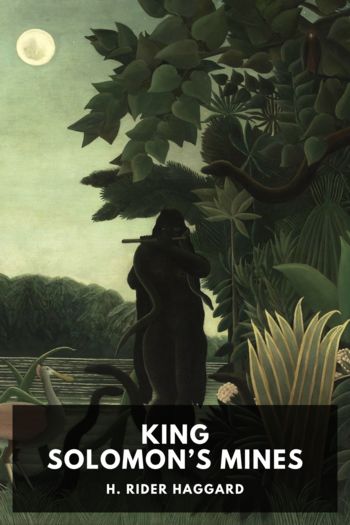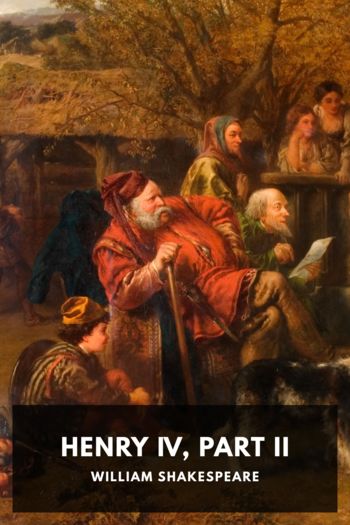King Solomon’s Mines - H. Rider Haggard (best life changing books .TXT) 📗

- Author: H. Rider Haggard
Book online «King Solomon’s Mines - H. Rider Haggard (best life changing books .TXT) 📗». Author H. Rider Haggard
Not very long before dawn I heard the Hottentot Ventvögel, whose teeth had been chattering all night like castanets, give a deep sigh. Then his teeth stopped chattering. I did not think anything of it at the time, concluding that he had gone to sleep. His back was resting against mine, and it seemed to grow colder and colder, till at last it felt like ice.
At length the air began to grow grey with light, then golden arrows sped across the snow, and at last the glorious sun peeped above the lava wall and looked in upon our half-frozen forms. Also it looked upon Ventvögel, sitting there amongst us, stone dead. No wonder his back felt cold, poor fellow. He had died when I heard him sigh, and was now frozen almost stiff. Shocked beyond measure, we dragged ourselves from the corpse—how strange is that horror we mortals have of the companionship of a dead body—and left it sitting there, its arms clasped about its knees.
By this time the sunlight was pouring its cold rays, for here they were cold, straight into the mouth of the cave. Suddenly I heard an exclamation of fear from someone, and turned my head.
And this is what I saw: Sitting at the end of the cavern—it was not more than twenty feet long—was another form, of which the head rested on its chest and the long arms hung down. I stared at it, and saw that this too was a dead man, and, what was more, a white man.
The others saw also, and the sight proved too much for our shattered nerves. One and all we scrambled out of the cave as fast as our half-frozen limbs would carry us.
VII Solomon’s RoadOutside the cavern we halted, feeling rather foolish.
“I am going back,” said Sir Henry.
“Why?” asked Good.
“Because it has struck me that—what we saw—may be my brother.”
This was a new idea, and we re-entered the place to put it to the proof. After the bright light outside, our eyes, weak as they were with staring at the snow, could not pierce the gloom of the cave for a while. Presently, however, they grew accustomed to the semidarkness, and we advanced towards the dead man.
Sir Henry knelt down and peered into his face.
“Thank God,” he said, with a sigh of relief, “it is not my brother.”
Then I drew near and looked. The body was that of a tall man in middle life with aquiline features, grizzled hair, and a long black moustache. The skin was perfectly yellow, and stretched tightly over the bones. Its clothing, with the exception of what seemed to be the remains of a woollen pair of hose, had been removed, leaving the skeleton-like frame naked. Round the neck of the corpse, which was frozen perfectly stiff, hung a yellow ivory crucifix.
“Who on earth can it be?” said I.
“Can’t you guess?” asked Good.
I shook my head.
“Why, the old Dom, José da Silvestra, of course—who else?”
“Impossible,” I gasped; “he died three hundred years ago.”
“And what is there to prevent him from lasting for three thousand years in this atmosphere, I should like to know?” asked Good. “If only the temperature is sufficiently low, flesh and blood will keep fresh as New Zealand mutton forever, and Heaven knows it is cold enough here. The sun never gets in here; no animal comes here to tear or destroy. No doubt his slave, of whom he speaks on the writing, took off his clothes and left him. He could not have buried him alone. Look!” he went on, stooping down to pick up a queerly-shaped bone scraped at the end into a sharp point, “here is the ‘cleft bone’ that Silvestra used to draw the map with.”
We gazed for a moment astonished, forgetting our own miseries in this extraordinary and, as it seemed to us, semi-miraculous sight.
“Ay,” said Sir Henry, “and this is where he got his ink from,” and he pointed to a small wound on the Dom’s left arm. “Did ever man see such a thing before?”
There was no longer any doubt about the matter, which for my own part I confess perfectly appalled me. There he sat, the dead man, whose directions, written some ten generations ago, had led us to this spot. Here in my own hand was the rude pen with which he had written them, and about his neck hung the crucifix that his dying lips had kissed. Gazing at him, my imagination could reconstruct the last scene of the drama, the traveller dying of cold and starvation, yet striving to convey to the world the great secret which he had discovered:—the awful loneliness of his death, of which the evidence sat before us. It even seemed to me





Comments (0)